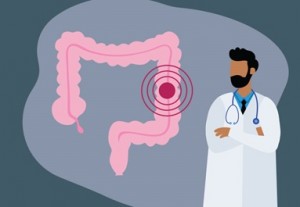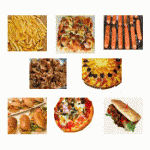 Imagine your colon functions fairly well for years. Unaware was that healthy cells in the inner lining of your colon developed changes in their DNA (i.e., mutation), and formed polyps that may start cancer, a couple of which reside on the left side of your colon. You are either asymptomatic or unchecked by mistaking cautionary signs as normal. Fortunately, one day these polyps (varying 0.4 to 10 mm in size) showed up on your colonoscopy and the surgeon successfully removed them, thus stopping the cancerous growth.
Imagine your colon functions fairly well for years. Unaware was that healthy cells in the inner lining of your colon developed changes in their DNA (i.e., mutation), and formed polyps that may start cancer, a couple of which reside on the left side of your colon. You are either asymptomatic or unchecked by mistaking cautionary signs as normal. Fortunately, one day these polyps (varying 0.4 to 10 mm in size) showed up on your colonoscopy and the surgeon successfully removed them, thus stopping the cancerous growth.
Unfortunately, millions of people had their polyps growing in size from tiny (about a match head) to giant (≥25 mm or almost 1 inch), from benign lumps progressed to malignant tumors that invade adjacent tissues or distant organs. Then we all know the sad ending.
How should you be aware that you need a colon cancer screening (when or based on what)? What’s new about colon cancer pertinent to you and your loved ones?
I summarized 4 takeaways from updated research findings here. In addition, I’m highlighting proven preventive measures in a memorable poetry style.
So, let’s dive in the takeaways.
1. Risk factor you might have overlooked
Primary risk factors for colorectal cancer can be categorized as:
- non-modifiable ones that you can’t control, such as age, taller height, family history, personal history of inflammatory bowel diseases or polyps (pre-cancerous growth), etc., and
- modifiable ones that are more lifestyle or diet behaviors related, including tobacco smoke, heavy intake of alcoholic beverages, obesity/overweight, high consumption of red or processed meats and dairy fats, and physical inactivity.
A recent, large study (based on 47 observational studies involving 280,644 colorectal cancer and 14,139 colorectal adenoma cases) indicated that taller individuals had a 14% higher risk of colon cancer and 6% higher odds of adenomas (a type of benign tumor). Note that taller stature has been linked to an increased risk of several other cancers.
The findings are intriguing and supported from other perspectives. For example, Laron syndrome (LS) is a rare genetic condition, characterized with congenital deficiency of insulin-like growth factor-1 and dwarfism. Patients with LS do not develop cancer.
This is significant yet overlooked because current cancer screening guidelines do not define height as a risk factor or relevant specifics that one should get screened. So, it’s up to doctors’ recommendations or an individual’s choice.
2. Age for colon cancer trending younger (under age 50)
In contrast to falling or steady rates of colorectal cancer incidence in older adults, a concerning trend is the rising occurrence of young people (< 50 years old) with colorectal cancer. Simply blaming obesity and diabetes in this population might be too early, because new studies shed a light from various angles. Gut microbiome may play a role in carcinogenesis as bacteria alter inflammatory and immune environment. High consumption of sugar-sweetened beverages in adolescence and young adulthood may also contribute to an increased risk of early-onset colorectal cancer.
In addition to reinforcing awareness, an immediate outcome improvement can be done by early screening. Multiple societies and the United States Preventive Services Task Force have updated their recommendation—individuals should initiate screening for colorectal cancer at age 45, instead of age 50.
3. Obesity as a strong and sustained risk
Obesity and/or being overweight is a well-known, independent risk factor for more than ten cancers, and with obesity comes a worse prognosis. We also know that gut microbiota imbalance can influence cancer, and there are identified colon cancer-promoting bacteria. Recent studies showed that changes in gut microbiota composition occur in patients with colon cancer, particularly among those having a BMI >25 kg/m2.
Cumulative history or effects of excess weight is another issue, as an investigation newly published on JAMA Oncology (online March 17, 2022) emphasized a greater role of cumulative lifetime excess weight in colon cancer risk. The researchers defined “cumulative lifetime exposure” as the subjective numbers of years lived with an overweight condition or obesity, and found that excess weight effect at all ages (between 20 and 70 years) studied is clearly associated with an increased colon cancer risk. In other words, the longer one is carrying excess body weight, the more likely he/she will develop colon cancer.
4. Polyps’ vulnerability and risk critical to screening methods
Although not all polyps will become cancer, many cancers, especially in colon, start from polyps. Vulnerability and/or risk of polyps turning to cancer depend on their size, shape, number, and microscopic characteristics or pathology. The larger in size and the more in number the polyps, the greater likelihood they are on the road to cancer. The good news is that polyps can be safely and successfully removed during the colonoscopy.
That’s why colon cancer screening is critical. There are several screening tests with variable specificity and sensitivity—from at-home, stool-based kits (e.g., fecal immunochemical test or FIT, Cologuard DNA test), a new blood-based biomarker test to sigmoidoscopy and colonoscopy. Of all, colonoscopy is still the gold standard, and a preferred test strategy.
However, consider as an early intervention, even starting with at-home kits, is better than doing nothing. Understandably, the cost associated with different preferences may be involved in the decision-making, that’s why your voice to ensure life-saving screening should be raised loudly.
At the end, colon cancer is a most common but preventable cancer!
I draw your attention to the effective, preventative strategies below in a poetry style.
Title: Reminder of Colon Cancer Prevention
Imagine your colon cool and smooth,
With a regular bowel move;
To steer away from cancer growth,
Your brain and action are your tools.
Rainbow dish stands a golden rule,
More water, veggies and fruits,
Less red and processed meats,
No smoke, alcohol, and junk foods;
Stay lean and burn fat,
Walk, run, or yoga, whatever you choose.
Let your motion get annoying pounds removed,
Let your screening discard any malign root;
Enlighten your disease prevention and a long life,
Keep a good, positive mood!
Image Credit: Cleveland Clinic Health Essentials


